| dc.contributor.author | Kessler, Ute | |
| dc.contributor.author | Schøyen, Helle Kristine | |
| dc.contributor.author | Andreassen, Ole Andreas | |
| dc.contributor.author | Eide, Geir Egil | |
| dc.contributor.author | Hammar, Åsa | |
| dc.contributor.author | Malt, Ulrik Fredrik | |
| dc.contributor.author | Ødegaard, Ketil Joachim | |
| dc.contributor.author | Morken, Gunnar | |
| dc.contributor.author | Sundet, Kjetil Søren | |
| dc.contributor.author | Vaaler, Arne Einar | |
| dc.date.accessioned | 2015-09-11T13:15:54Z | |
| dc.date.accessioned | 2015-09-17T08:03:40Z | |
| dc.date.available | 2015-09-11T13:15:54Z | |
| dc.date.available | 2015-09-17T08:03:40Z | |
| dc.date.issued | 2013 | |
| dc.identifier.citation | BMC Psychiatry 2013, 13 | nb_NO |
| dc.identifier.issn | 1471-244X | |
| dc.identifier.uri | http://hdl.handle.net/11250/300386 | |
| dc.description.abstract | Background: The literature on the neuropsychological profiles in Bipolar disorder (BD) depression is sparse. The
aims of the study were to assess the neurocognitive profiles in treatment-resistant, acutely admitted BD depression
inpatients, to compare the neurocognitive functioning in patients with BD I and II, and to identify the demographic
and clinical illness characteristics associated with cognitive functioning.
Methods: Acutely admitted BD I (n = 19) and BD II (n = 32) inpatients who fulfilled the DSM-IV-TR criteria for a
major depressive episode were tested with the MATRICS Consensus Cognitive Battery (MCCB), the Wechsler
Abbreviated Scale of Intelligence, the National Adult Reading Test, and a battery of clinical measures.
Results: Neurocognitive impairments were evident in the BD I and BD II depression inpatients within all MCCB
domains. The numerical scores on all MCCB-measures were lower in the BD I group than in the BD II group, with a
significant difference on one of the measures, category fluency. 68.4% of the BD I patients had clinically significant
impairment (>1.5 SD below normal mean) in two or more domains compared to 37.5% of the BD II patients
(p = 0.045). A significant reduction in IQ from the premorbid to the current level was seen in BD I but not BD II
patients. Higher age was associated with greater neurocognitive deficits compared to age-adjusted published
norms.
Conclusions: A high proportion of patients with therapy-resistant BD I or II depression exhibited global
neurocognitive impairments with clinically significant severity. The cognitive impairments were more common in
BD I compared to BD II patients, particularly processing speed. These findings suggest that clinicians should be
aware of the severe neurocognitive dysfunction in treatment-resistant bipolar depression, particularly in BD I.
Keywords: Bipolar disorder depression, Cognitive functioning, MATRICS, IQ, Bipolar II disorder | nb_NO |
| dc.language.iso | eng | nb_NO |
| dc.publisher | BioMed Central | nb_NO |
| dc.title | Neurocognitive profiles in treatment-resistant bipolar I and bipolar II disorder depression | nb_NO |
| dc.type | Journal article | nb_NO |
| dc.type | Peer reviewed | en_GB |
| dc.date.updated | 2015-09-11T13:15:54Z | |
| dc.subject.nsi | VDP::Medisinske fag: 700::Klinisk medisinske fag: 750::Psykiatri, barnepsykiatri: 757 | nb_NO |
| dc.subject.nsi | VDP::Midical sciences: 700::Clinical medical sciences: 750::Psychiatry, child psychiatry: 757 | nb_NO |
| dc.source.volume | 13 | nb_NO |
| dc.source.journal | BMC Psychiatry | nb_NO |
| dc.identifier.doi | 10.1186/1471-244X-13-105 | |
| dc.identifier.cristin | 1023736 | |
| dc.description.localcode | © 2013 Kessler et al.; licensee BioMed Central Ltd. This is an Open Access article distributed under the terms of the Creative Commons Attribution License (http://creativecommons.org/licenses/by/2.0), which permits unrestricted use, distribution, and reproduction in any medium, provided the original work is properly cited. | nb_NO |
